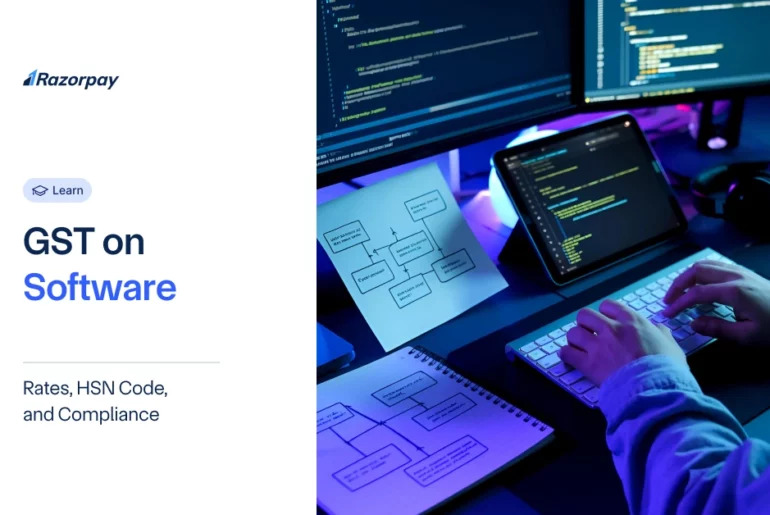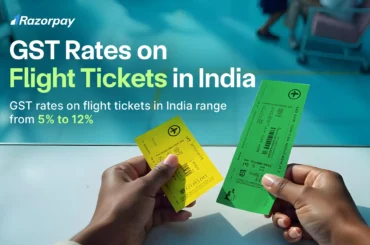In today’s digital age, software is integral to the operations of almost every business. Whether it’s used for accounting, communication, or design, understanding the GST implications on software is essential. Software, whether sold as a product or service, falls under specific GST categories with defined rates and HSN codes. Proper knowledge of these aspects helps businesses accurately determine GST liability, streamline accounting processes, and maintain smooth operational flow.
Table of Contents
What Is GST on Software Services?
GST on software is the tax levied on software sales and services. Unlike physical goods, software can be delivered digitally or physically, affecting its tax treatment. It is classified as goods if sold in a tangible medium and as a service if downloaded or accessed online. This classification determines the applicable GST rate and compliance requirements.
Understanding GST Applicability on Software and Software Services
GST on software depends on how it is supplied. It can be classified as goods or services, affecting its tax rate and compliance requirements.
1. Classification of Software under GST
- Off-the-shelf software (Goods): Pre-developed software sold on physical storage devices (CDs, USBs) or through encryption keys is treated as goods under HSN code 8523.
- Customised software (Services): Software developed, modified, or upgraded as per client requirements is classified as a service under GST.
2. Taxation Based on Supply Mode
- Offline supply: If software is sold physically or through a license key, it attracts GST as goods.
- Online supply: Downloadable software or cloud-based applications fall under OIDAR (Online Information and Database Access or Retrieval) services and are taxed accordingly.
3. GST Exemptions and Special Cases
- Government-issued software and certain categories of software have a Nil GST rate.
- Import of software services is taxed under the Reverse Charge Mechanism (RCM), requiring the importer to pay GST.
- Export of software services and supplies to SEZ units are zero-rated, meaning no GST is charged, but businesses can claim an input tax credit (ITC) on all resources used to produce the exported services.
HSN Code & GST Rate for Software and Software Services Explained
The HSN (Harmonised System of Nomenclature) code is an internationally recognised system used to classify goods and services for taxation. Under GST, HSN codes help in standardising tax rates and ensuring compliance. Software is taxed differently based on whether it is supplied as goods (tangible form) or services (digital or customised solutions).
1. HSN Codes and GST Rates for Software
Tangible Software (Physical Medium)
HSN Code |
Description |
GST Rate |
|
49119910 |
Printed software (hardcopy) |
12% |
|
85232990 |
Software recorded on sound media |
18% |
|
85238020 |
Discs containing IT software |
18% |
|
85238090 |
Other recorded media |
18% |
|
85243111 |
IT software on discs |
0% (Exempt) |
|
85244011 |
IT software on magnetic tapes |
0% (Exempt) |
|
85249112 |
IT software on CDs |
0% (Exempt) |
Intangible Software (Online Services)
HSN Code |
Description |
GST Rate |
|
99831 |
IT services, consulting, and software solutions |
18% |
|
998311 |
Management and financial consulting |
18% |
|
998312 |
Enterprise advisory services |
18% |
|
998313 |
IT guidance and maintenance services |
18% |
|
998314 |
IT system design and formulation |
18% |
|
998315 |
IT system hosting and infrastructure setup |
18% |
|
998316 |
IT systems and networking management |
18% |
|
998319 |
Other IT-related services |
18% |
2. GST Rate Breakdown
- 18% GST: Applies to most software products and IT services, including pre-packaged software, IT consulting, and cloud-based solutions.
- 12% GST: Limited to printed software in hardcopy format.
- 0% GST: Certain government-issued software and IT software recorded on CDs, discs, or tapes.
Can You Claim ITC on GST for Software Services?
ITC allows businesses to reduce their GST liability by claiming credit on taxes paid for software purchases. If the software is used for business operations, such as accounting, HR, or logistics, you can claim ITC and offset it against your output GST.
Businesses purchasing software for commercial use, including cloud-based tools and enterprise solutions, are eligible for ITC. However, individuals buying software for personal use, such as video editing or antivirus software, cannot claim ITC as it is not linked to business activities.
To claim ITC, ensure the software supplier is GST-registered and provides a valid tax invoice. The purchase must be reflected in your GSTR-2B, and the tax must be paid through banking channels. While filing GSTR-3B, declare the ITC and output tax liability details. Proper documentation and compliance with GST filing rules are essential to avoid penalties and maximise tax benefits.
Frequently Asked Questions (FAQs):
1. Do software upgrades attract GST?
Yes, software upgrades are considered a new supply and attract GST at prevailing rates.
2. Are there any exemptions in GST for open-source software?
If open-source software is freely available, there’s no GST. But if you charge for customisation, support, or licensing, you need to apply 18% GST on those services.
3. How are Software as a Service (SaaS) products taxed under GST?
SaaS is treated as an OIDAR (Online Information Database Access and Retrieval) service and is taxed at 18% GST.
4. Is software a product or service?
Software can be classified as both:
- Goods: If supplied in physical form (CDs, USBs, etc.).
- Services: If downloaded, cloud-based, or customised for a business.
5. Does GST apply to foreign software purchases in India?
Yes, if you buy software from an overseas provider, you must pay IGST under RCM. However, you can claim ITC if the software is used for business purposes.
6. Is GST applicable on software maintenance and support services?
Yes, maintenance, technical support, and annual service contracts are considered services and are taxed at the applicable rate.
7. How does GST impact freelancers selling software development services?
GST for freelancers applies if earnings exceed ₹20 lakh (₹10 lakh in special category states). They must charge 18% GST on services and file returns accordingly.
8. What are the GST penalties for non-compliance in software businesses?
Non-compliance can lead to:
- Late fee: ₹50 per day (₹20 for NIL return).
- Interest: 18% per annum on unpaid GST.
- Penalty for tax evasion: 10% of tax due or ₹10,000 (whichever is higher).



